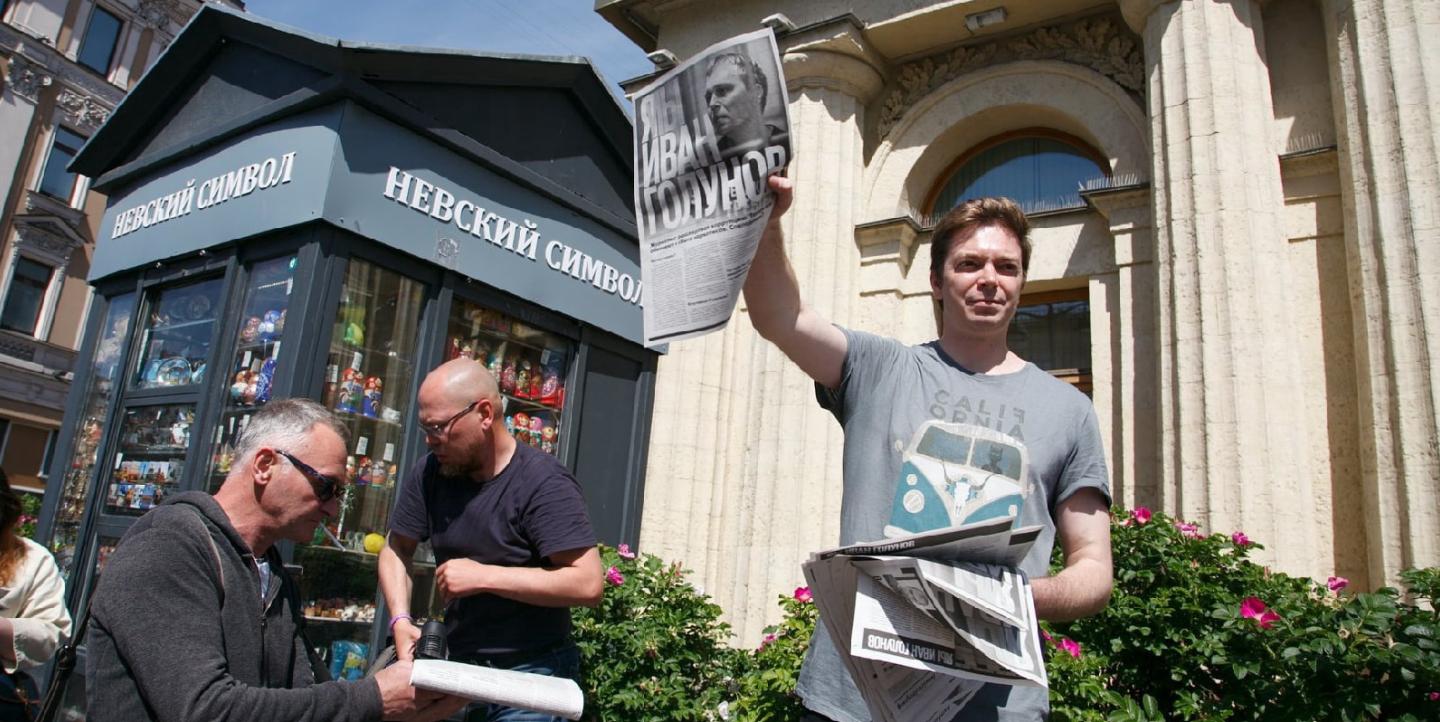|
In late March, Russian authorities forced Novaya Gazeta, one of Russia's oldest and largest independent newspapers, to close. A month later, attackers doused the outlet’s editor-in-chief, and Nobel Peace Prize winner, Dmitry Muratov with paint laced with acetone. "Take that for our boys," the unknown perpetrators mocked. Since Novaya Gazeta launched in 1993, six journalists working for the outlet have been killed. Still more have received threats. Following the paint attack, Muratov went to the hospital with eye burns. Novaya Gazeta’s editorial team investigated and published an article about the incident. Continuing the workWhen Russia launched its invasion of Ukraine in late February, Novaya Gazeta was unsure how it would cover developments around the war. The first step the outlet took was to create a timeline of events. Within days, however, Roskomnadzor, the government agency that oversees media activities in Russia, issued the newsroom a warning: the invasion could only be referred to as a “military operation” — and by no means a “war.” Faced with the choice to comply with the requirements or stop reporting on the war altogether, Novaya Gazeta decided to turn to its readers for their feedback. “Most readers responded that it was more important to continue the work, and therefore we should comply,” said Serafim Romanov, managing editor of Novaya Gazeta in St. Petersburg. “In just half a night, we removed almost 300 articles related to the events in Ukraine from our website.” The newsroom's lawyers developed guidelines for the editorial staff, Romanov explained. For instance, when reporting on victims of the war, articles should also indicate the official position of Russia’s Ministry of Defense. In general, news pieces were to include quotes from Russian authorities reflecting the Kremlin’s narrative. “Each article was proofread by the lawyers before publication, and our website's content management system would highlight names of organizations labeled ‘undesirable’ by Roskomnadzor — foreign agents, undesirable or banned agencies — and the word ‘war,’" he said. “Russia also passed its law on the spread of ‘fake’ information about the Russian military. It imposed criminal penalties of up to 15 years. It was then that we realized what a new reality for journalism we were in.” Russia’s crackdown on the media led independent media like Telekanal Dozhd (TV Rain, in English) to stop its reporting, as well as Znak.com and Ekho Moskvy (Echo of Moscow), one of the country’s oldest outlets. Meanwhile, the pressure on Novaya Gazeta also grew. "At first there were problems with the distribution of the print version. Instead of receiving new issues, readers started getting handwritten notes in their mailboxes saying that Novaya Gazeta was banned. They were signed: 'Respectfully, your mailman.’ When people called the post office, they were told that the newspaper was closed and subscriptions were not accepted. That went on for a week,” explained Romanov, adding that post office representatives denied the accusations. The outlet began selling newspapers out of its offices in response. Since the full-scale war broke out, Novaya Gazeta has experienced dips in site traffic and disruptions to its accessibility, including being disconnected from the content aggregator, Yandex Zen, and a drop in its search engine ranking, said Romanov. On March 22, RIA Novosti, one of the largest pro-government news agencies in Russia, published a piece saying that Novaya Gazeta had been issued a warning for not identifying an organization as a foreign agent. Failure to comply with this requirement more than once within a year can lead a court to revoke a newsroom of its license to operate as accredited media. "We managed to get the document with the text of the warning only a few days later, with the help of a lawyer. It was then that we finally learned what exactly we were fined for. That was on Friday, and on Monday, RIA Novosti wrote that the paper was warned a second time," said Romanov. “We immediately announced that we were suspending operations. It could have been much worse: for example, if we had been included in the register of extremist or undesirable organizations. Imagine if Novaya Gazeta journalists were equated with members of the Taliban.” In early May, exiled journalists from Novaya Gazeta launched a new publication, NovayaGazeta.Europe, from Latvia to continue reporting from abroad. Meanwhile, Novaya Gazeta reporters who remain in Russia are preparing for a return to work when the situation is resolved to an acceptable extent, explained Romanov. "There was hope for a withdrawal, but you saw the pictures from Bucha," he said, referring to the photos of civilians killed by Russian forces in Bucha, a Ukrainian city nearby Kyiv. Pushing back on attempts by several Russian media outlets and pro-Russian social media accounts to cast doubt on the authenticity of these photos, Romanov added: “I don't really understand what kind of evidence is needed, because you can call any photo and video fake [if you want] — and perhaps this results in the impunity of those who did this.” I spoke with Romanov about how journalism in Russia has changed since the war began, how Novaya Gazeta has navigated the crackdown on independent media in the country, and what to expect next. Do you have freedom of speech when it comes to the war in Ukraine?The war in Ukraine was the point after which the authorities finally stopped pretending that there was no censorship in the country. [The government] had tried to support this image [of press freedom] on the international level. But after February 24, they started blocking news websites and issuing warnings to journalists without any formal grounds whatsoever. Now we have come to the point where telling the truth about this war is simply impossible. If you are an officially registered media outlet in Russia, you have no "legal" way to get this information to your readers and viewers. Therefore, the time has come for underground and offshore journalism. No one in the Ministry of Defense in Russia will give accreditation to independent media. Without accreditation, no media outlet can ensure the safety of its journalists. And those who went [to Ukraine] — Oksana Baulina, [for instance] the journalist from The Insider who was killed while on the job, was quite an experienced person. Which Russian journalists would you recommend following?Independent journalism is on pause, but many media outlets are up and running even though they have been blocked in the country. A lot of creator-owned Telegram and YouTube channels have also appeared. For example, the former head of TV Rain, Tikhon Dziadko, and his wife Ekaterina Kotrikadze have their own YouTube channel, where they published a sensational interview with [Ukrainian President Volodymyr] Zelensky. Anastasia Chumakova launched her own media outlet, Astra, dedicated to investigating war crimes in Ukraine, after she was fired from RTVI. Journalist Farida Rustamova founded Faridaily. She was a political observer in the State Duma, and now she's trying to figure out what politicians are planning, and when the war will end. Many people in Russia don't seem to be touched by the fact that there's a war going on right now, and that many media outlets are blocked. How do you maintain your purpose in this context?There is a serious discussion about this in the professional community. People are experiencing burnout and total disillusionment with the profession. Journalistic stars are rising against this backdrop — but still, you feel helpless. Some advise everyone to leave the profession. Others say, ‘No, I'll be the last one to turn off the lights. Even if everyone leaves.’ Speaking for myself, I can't shake the feeling that it's all like a movie. Maybe I'm underestimating the personal risks and the fact that I lost my job. How can journalists get through this difficult time?Think about how to lead the journalism of the future. Russian journalism is going to have to undergo a radical restructuring. Consider how to stay in the profession, be more independent, develop channels for working with readers, and how to do this outside of Russian jurisdiction. Main image: Serafim Romanov at a rally to the defense of journalist Ivan Golunov in St. Petersburg, June 2019, photo by Georgy Markov. This article was originally published in Russian and translated into English. |


